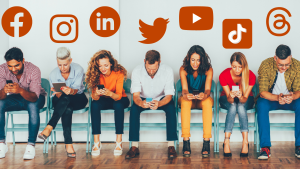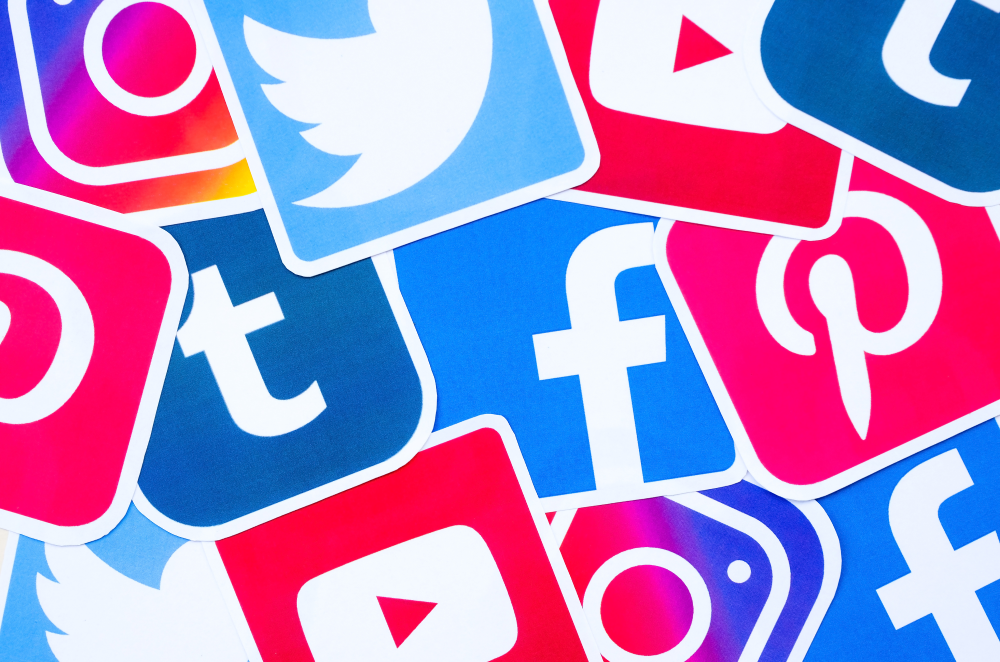Introduction
Social media has become an integral part of modern society, shaping the way people communicate, consume information, and interact with the world around them. Platforms like Facebook, Twitter, Instagram, TikTok, and LinkedIn have transformed how we connect with one another, revolutionizing both personal relationships and professional networks. However, the rapid growth of these platforms has also sparked debates about their broader impact on society. In this article, we explore how social media sites affect society across various domains, from communication and mental health to politics and culture.
The Evolution of Social Media

Social media’s journey began with simple platforms designed for connecting people. Over time, these platforms have evolved into complex ecosystems that influence nearly every aspect of modern life. Initially, social media served as a tool for personal connection, but it has since grown to encompass business, education, politics, and culture.
Social media has evolved dramatically since its inception in the early 2000s. What began as simple networking sites like Facebook and MySpace has transformed into a vast ecosystem of platforms, including Facebook, Twitter, Instagram, TikTok, and LinkedIn. Each platform caters to different demographics and purposes, leading to varied impacts on society. Understanding this evolution is crucial in analyzing the overall influence of social media.
The Role of Social Media in Shaping Public Opinion and Discourse
Social media platforms have become powerful tools for shaping public opinion and facilitating discourse. In today’s hyperconnected world, information spreads rapidly across platforms, influencing public sentiment and collective action. Twitter, in particular, has become a go-to platform for news updates, debates, and the dissemination of information.
While social media provides a space for dialogue on important social, political, and cultural issues, it has also contributed to the spread of misinformation and echo chambers. Algorithms that prioritize content based on user preferences can create biased information bubbles, where individuals are only exposed to views that align with their own. This can deepen polarization in society and limit critical thinking.
The Positive Impact of Social Media

1. Enhanced Communication and Connectivity
One of the most significant benefits of social media is its ability to connect people across the globe. It has revolutionized communication by allowing individuals to interact with friends, family, and strangers instantly. This connectivity has fostered a sense of community, enabling users to share experiences, ideas, and cultures. Furthermore, social media platforms serve as essential tools for networking, helping professionals connect and collaborate.
2. Access to Information
Social media has democratized access to information. Users can quickly share news, research, and opinions, making it easier for individuals to stay informed about global events. This instantaneous access encourages diverse perspectives and facilitates discussions on pressing social issues. Additionally, organizations and activists can utilize social media to raise awareness and mobilize support for various causes.
3. Activism and Social Change
Social media has empowered grassroots movements, enabling individuals to organize, mobilize, and advocate for social change. The #BlackLivesMatter and #MeToo movements illustrate how social media can amplify voices and bring attention to critical societal issues, leading to significant policy changes and increased awareness.
The Negative Impact of Social Media

1. Mental Health Concerns
Despite its advantages, social media poses several risks, particularly concerning mental health. Studies have shown a correlation between heavy social media usage and increased levels of anxiety, depression, and loneliness. The constant comparison to curated online personas can lead to feelings of inadequacy and low self-esteem. Additionally, cyberbullying and online harassment have become prevalent issues, further exacerbating mental health challenges.
2. Polarization and Misinformation
Social media platforms can contribute to political polarization and the spread of misinformation. Algorithms often prioritize sensational content, leading to echo chambers where users are exposed only to viewpoints that reinforce their beliefs. This environment can hinder constructive discourse and exacerbate societal divisions. Misinformation campaigns can also mislead the public, impacting elections and public health initiatives.
3. Cyberbullying
Social media platforms can be breeding grounds for cyberbullying, where individuals are targeted, harassed, or threatened online. The anonymity afforded by these platforms can embolden bullies, leading to severe emotional distress for victims.
Political and Social Movements
Social media has become a strong tool for political activism and social movements. Platforms like Facebook, Twitter, and Instagram let people organize, share ideas, and raise awareness about important issues. This gives individuals and groups the power to challenge authorities, point out unfairness, and push for social change. Movements like #MeToo, Black Lives Matter, and climate activism have grown because of social media. These platforms help people who were once ignored to have their voices heard around the world.
However, social media’s role in politics has caused some problems. Issues like false information and privacy worries have raised questions about how social media affects elections and public opinion. The spread of wrong or misleading information, especially during election campaigns, has led to discussions about whether social media platforms should be regulated and what their responsibilities are to the public.
Cultural Influence and Trends

Social media platforms are trendsetters, shaping cultural norms and influencing public opinion. Viral content, memes, and influencers play a significant role in defining popular culture. Social media allows for the rapid dissemination of ideas, leading to the emergence of global trends.
This cultural influence extends to industries such as fashion, music, and entertainment. Brands leverage social media to reach wider audiences, while influencers collaborate with companies to promote products and services. The democratization of content creation has allowed individuals to gain fame and influence, challenging traditional media hierarchies.
Privacy and Ethical Concerns
The vast amount of personal data shared on social media raises significant privacy and ethical concerns. Users often unknowingly provide platforms with access to their personal information, which can be exploited for targeted advertising and data mining. The Cambridge Analytical scandal highlighted the potential misuse of user data, leading to increased scrutiny of social media companies.
Moreover, the ethical implications of social media algorithms are a growing concern. These algorithms prioritize content based on user engagement, which can lead to the amplification of harmful or misleading information. The responsibility of social media companies to regulate content and protect user privacy is a topic of ongoing debate.
Social Media and Businesses

Social media has become an important tool for businesses to reach customers. Companies use platforms like Facebook and Instagram to advertise their products and connect with their audience. This interaction can build brand loyalty and increase sales. However, businesses need to watch their online reputation because negative comments can spread quickly. Overall, social media offers great chances for marketing but requires careful management.
From a business point of view, social media has changed how companies market and engage with customers. They now rely on social media strategies to reach their target audiences, using platforms like Instagram and Facebook for advertising, working with influencers, and creating content. The rise of social commerce, where customers can buy products directly through social media apps, has also changed the retail industry.
The Role of Social Media in Education
Many schools and colleges now use social media to improve learning. Teachers can share resources, hold discussions, and talk with students outside of class. Students can also work together on projects and share ideas easily. However, social media can be distracting, as students may spend more time on entertainment instead of studying. Finding a balance is important for using social media effectively in education.
The Influence of Social Media on Politics
Social media has changed how people interact with politics. It allows politicians to talk directly to voters, share their messages, and gather support. Social media has also become a place for political activism, where citizens can express their opinions and organize movements. However, it can lead to polarization, as people may only follow those with similar views. Understanding these issues is important for navigating today’s political landscape.
Cultural Impacts: Social Media and Globalization
Social media has sped up globalization by allowing ideas, culture, and trends to cross borders more easily. Platforms like YouTube and Instagram have helped global influencers reach people everywhere, no matter where they are. This has made the world more connected and has blurred cultural boundaries.
While this has created new trends and global movements, it also raises worries about cultural loss. Western content dominates many social media platforms, and this can cause local cultures to fade. People around the world start adopting similar values, behaviors, and buying habits influenced by global trends.
The Future of Social Media

As social media continues to evolve, so do the ethical concerns surrounding privacy, data security, and the monopolistic power of tech giants. The commercialization of personal data has sparked widespread debates about user rights, as people become more aware of how their online behavior is tracked and monetized by social media companies.
As technology advances, the impact of social media is likely to grow even more profound. Emerging trends like virtual reality and augmented reality are set to revolutionize user experiences. Additionally, as awareness of mental health issues and misinformation rises, platforms may implement more stringent regulations to promote healthier interactions and credible information sharing.
Analysis of Social Media Impact
| Aspect | Positive Impact | Negative Impact |
| Communication | Connects individuals globally | Can lead to misunderstandings and conflict |
| Information Access | Provides real-time news and educational content | Spreads misinformation and fake news |
| Activism | Empowers social movements and advocacy | May oversimplify complex issues |
| Mental Health | Can foster support networks | Linked to anxiety, depression, and low self-esteem |
| Cyberbullying | Facilitates community support for victims | Increases incidents of harassment and bullying |
Comparative Analysis of Social Media Platforms
Different social media platforms offer unique features and experiences, affecting their impact on society. The comparative table below highlights key differences among popular platforms.
Comparative Analysis of Social Media Platforms
| Platform | Primary Purpose | Target Audience | Key Features | Main Concerns |
| Social networking | All ages | Groups, events, news feed | Privacy issues, misinformation | |
| Microblogging | Young adults to seniors | Short posts (tweets), trending topics | Misinformation, harassment | |
| Visual sharing | Teens and young adults | Photos, stories, reels | Body image issues, cyberbullying | |
| TikTok | Short video sharing | Gen Z and millennials | Short videos, trends | Privacy concerns, addiction |
Conclusion
The impact of social media on society is profound and multifaceted. While it offers numerous benefits, such as enhanced communication, community building, and cultural exchange, it also presents challenges related to mental health, privacy, and misinformation. As social media continues to evolve, it is crucial for individuals, policymakers, and companies to navigate its complexities and harness its potential for positive change.
In understanding the social media impact, society must strive for a balance that maximizes benefits while mitigating negative consequences. By fostering digital literacy, promoting ethical practices, and encouraging meaningful connections, we can shape a future where social media contributes positively to society.




